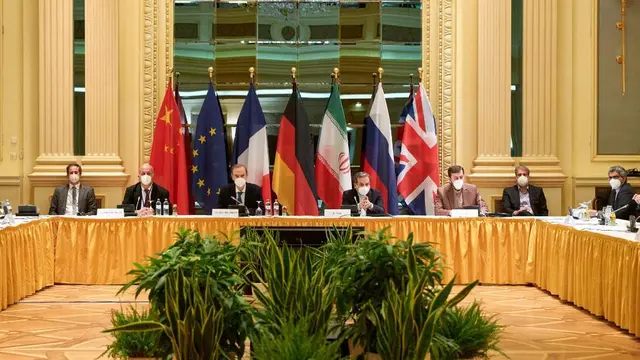Negotiators in Vienna have begun drafting proposals for the United States and Iran to return to compliance with the Iran nuclear deal, officials involved in the talks said Monday.
“Practical solutions are still far away,” Mikhail Ulyanov, the Russian delegate to the talks, said on Twitter. “But we have moved from general words to agreeing on specific steps toward the goal.”
Enrique Mora, the European Union diplomat coordinating the discussions, said progress had been made. The Joint Commission that supervises the 2015 agreement, called the Joint Comprehensive Plan of Action, or JCPOA, will convene Tuesday “to take stock of the work done by expert-level working groups and consider next steps.”
The talks include all signatories to the deal — Britain, France, Germany, Russia and China, as well as Iran, with the United States participating indirectly. President Biden has said he wants to reenter the agreement from which former president Donald Trump withdrew three years ago.
Negotiations that began last month toward that goal were interrupted by an attack on Iran’s Natanz nuclear facility widely believed to have been launched by Israel, which has opposed the United States rejoining the deal. The Biden administration said it had no involvement in the attack.
In response, Iran escalated its steady violation of the terms of the agreement, saying it would begin enriching uranium to 60 percent, far beyond the original 3.67 percent allowed under the JCPOA and much closer to the level required to fuel a nuclear weapon.
But since the talks resumed last week, Iranian nuclear negotiator Abbas Araqchi said, participants have “had good discussions” on the reports submitted by working groups. “It seems that a new understanding is emerging and there is now common ground among all on the final goal,” he said.
Iran has refused direct meetings with the United States. Instead, the Europeans have shuttled between the Iranian team and U.S. negotiators, led by special envoy Robert Malley, in a separate Vienna location. Malley is expected to return to Washington in the coming days for consultations within the administration, as other negotiators also travel to their capitals.
A State Department spokesperson characterized the discussions as “thorough and thoughtful, if indirect. We have shared ideas among the delegations present. There have been no breakthroughs, but we did not expect this process to be easy or quick.”
Throughout the talks, Iranian officials have taken a hard public line, insisting the United States, having withdrawn from the deal, must take the first steps back into compliance. Iran wants all sanctions initially lifted as part of the agreement but reimposed by Trump, along with an estimated 1,500 new measures his administration adopted as part of its “maximum pressure” campaign, to be removed.
“The United States must first return to its commitments, and we must verify, and then Iran will stop its compensatory actions,” Iranian Foreign Ministry spokesman Saeed Khatibzadeh said in a press briefing Monday, according to Iran’s Mehr News Agency.
But according to officials familiar with the talks, both Iran and the Biden administration — which initially made a similar demand that Iran act first by returning to compliance with the original terms of the deal — are moving toward simultaneous, sequential steps. The officials spoke on the condition of anonymity to discuss sensitive negotiations.
Biden national security adviser Jake Sullivan said on “Fox News Sunday” that “a new understanding” was emerging from the talks, focusing on “compliance for compliance.”
“I think that there is real goodwill among both parties to reach an agreement, and that’s good news,” top E.U. diplomat Josep Borrell said.
“I think that both parties are really interested in reaching an agreement, and they have been moving from general to more focused issues, which are clearly, on one side, sanction-lifting and, on the other side, nuclear implementation issues.”
Also in Vienna on Monday, the International Atomic Energy Agency, in charge of monitoring Iranian compliance with the agreement, started separate talks with Iran on uranium traces the IAEA found at undeclared locations there.
Iran agreed to the expert-level talks after European members of the JCPOA threatened to seek a resolution criticizing Tehran at the agency’s board of directors meeting last month.
“The IAEA and Iran began today to engage in a focused process aimed at clarifying outstanding safeguards issues,” the IAEA said in a statement.
Meanwhile, the Financial Times reported that Iran and Saudi Arabia held direct talks in Iraq aimed at easing tensions between the regional rivals. Much of the meeting, facilitated by Iraqi Prime Minister Mustafa al-Kadhimi, reportedly centered on Yemen, where Iranian-backed Houthi rebels have fought a years-long war against Saudi forces.
The United Nations has been trying to negotiate a peace in Yemen, which it has described as the world’s worst humanitarian disaster, where millions depend on hard-to-deliver outside humanitarian aid for food and medical care.
The Biden administration, pulling back from Trump’s warm embrace of the repressive Saudi monarchy, has canceled Yemen-related arms sales to the kingdom and appointed its own special envoy to aid in negotiations.
Saudi Arabia made no official comment on the report, which was denied by unnamed officials in the Saudi media.
In Tehran, Khatibzadeh, the Foreign Ministry spokesman, refused to confirm or deny the meeting, which reportedly took place April 9. But Iran, he said, “has always welcomed talks with the Saudi kingdom and has deemed it beneficial to the two countries’ people and regional peace and stability, and this thought will continue.”
(THE WASHINGTON POST)
 简体中文
简体中文

